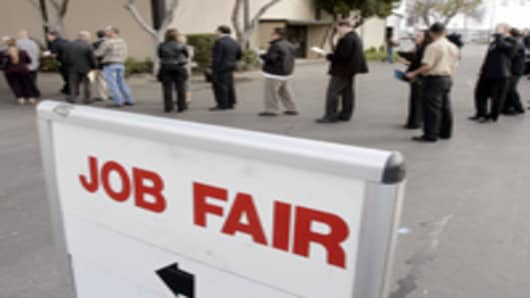Like Linus searching for his trusty old blanket, stock market investors are looking for a sense of security and are hoping it will come with this week's jobs report.
Economists expect the US economy generated about 540,000 jobs in May—a large portion of which expected to come from Census hiring—and many analysts will be hoping that's enough to assuage investor fears that the European debt contagion could cause a double-dip recession.
"The market's just looking for affirmation that the economy here is still growing. That's the biggest concern," says Gary Flam, portfolio manager at Bel Air Investment Advisors in Los Angeles. "If the economy continues to grow and this is just a normal correction, the market will continue to grow. But if Europe drags down our economy, some more dour outcomes can be envisioned."
The markets have reacted violently over the past six weeks to fear that Europe's problems could become US problems. Major averages have sold off a shade more than 10 percent from the most recent high, putting stocks in correction territory.
But Tuesday's manufacturing numbers show how far a little good news can go: Futures indicated the Dow would sell off more than 100 points off the open, but stocks had a relatively strong session.
A strong print on the jobs number, then, could head the correction off at the pass.
"Solid job growth is going to make a huge difference this year," says Kurt Karl, chief US economist at Swiss Re in New York. "We should get about 200,000 a month. It's not a gigantic number but it will be enough to sustain this recovery."
Karl has reduced his forecast of a US double-dip from 15 percent to 10 percent, though it is at 20 percent for a double-dip in Europe.
"Over the next four months as it becomes clear that they're addressing the fiscal issues, that worry should abate," Karl said of fears that Europe will drag on the US growth.
Still, many economists think there will be some Eurozone impact.
Peter Cardillo, chief economist at Avalon Partners in New York, represents a widely held viewpoint that the problems will shave about half a percentage point of US gross domestic product growth in the second quarter.
But he thinks the US stock market will grow as much as 15 percent by year's end.
"The fear factor that we had in the market is stemming from worry that perhaps we could be headed for another credit crunch in Europe that would obviously affect the rest of the world's economies," Cardillo says. "A lot of that is grossly exaggerated. The basis of growth will continue."
Interestingly, Cardillo's projection for Friday's jobs number is growth of 350,000—well below consensus—and a slight drop in the jobless rate to 9.9 percent. The difference in his projection comes from Census workers, where he sees lighter hiring than other forecasts.
He believes job creation will continue at a clip of 250,000 to 300,000 a month into the summer months and picking up speed from there.
Such numbers will be necessary to sustain projections from the Federal Reserve, which recently predicted that the jobless rate would fall to an average of 9.3 percent for 2010 and 8.2 percent for 2011.
That kind of drop from the current 9.9 percent rate would require the creation of 323,000 jobs for each of the next 20 consecutive months, according to calculations from Nicholas Colas, chief market strategist at ConvergEx in New York. The economy has added that many jobs only 10 percent of the time in the past 20 months, Colas added.
"While skeptical the economy will month-after-month add the jobs necessary to hit the Fed's projected jobless rates, it appears the worst is behind us in terms of the employment picture," Colas says. "It may just be a longer road to recovery than many anticipate."
Investors, though, might want to use the anticipated recovery as a buying opportunity now that the long-awaited correction off the 70 percent market rally has taken place.
"The market in general is giving some opportunity here. If you do your homework you can find some really good stuff to buy," says Michael Cohn, chief market strategist at Global Arena Investment Management. "You've got to stick with US and selected emerging markets and you probably can make some investments that you can hold onto for a very long period of time."
Cohn says investors can pick up companies like Petrobras and Johnson & Johnson as recovery plays, and should get more aggressive as the economy picks up steam.
"Valuations here for US stocks are more than reasonable," he says. "Whatever shoe is going to drop in the future you shouldn't ignore. But you shouldn't let it deter you."



